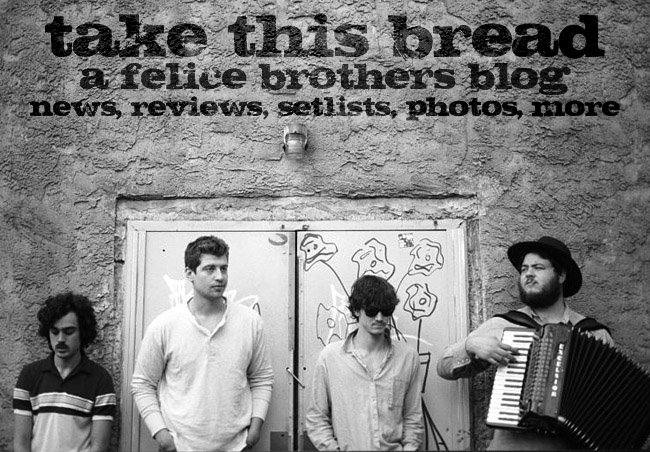nostalgia twice-removed makes something new? the felice brothers, “frankie’s gun.”
The Felice Brothers.
Culture Rover
The Felice Brothers make music of twice-removed nostalgia, sounding like The Band of the 1970s singing about the vanishing America of the 1920s and 30s.
The group channels the best of The Band at every turn: the accordion flourish that starts “Frankie’s Gun”; the thudding drum sound; Ian Felice’s Dankoesque herky-jerky vocal stylings; the wondrous harmony singing; the barroom chug, somewhere between a lilt and a stomp. The group is even from the Catskills, for godsakes! It’s as if the Felice Brothers just wandered out of a Big Pink Basement Tapes session.
But don’t let the obvious comparisons fool you. Nostalgia twice-displaced is, in its way, something brand new.
Sounding something like The Band on Cahoots, the 1971 album that most found Robbie Robertson getting his Martin Scorsese retro-cinema stylings on, “Frankie’s Gun” is the story of a gangster accidentally shot by his buddy’s bullets after making a pickup in Chicago (“I could have sworn the box said Hollywood blanks”). One thinks of the budding buddy-movie relationship between Al Capone (Stephen Graham) and Jimmy Darmody (Michael Pitt) on the new HBO retro-gangster series Boardwalk Empire (see upcoming CR post)—though the Felice Brothers song preceded that show.
There’s a kind of absurdist joy in “Frankie’s Gun,” punctuated by Ian Felice’s final yodel to end the track. The song celebrates stupidity and violence coupled together in the service of a simultaneous loyalty to traditional family ties (“I saw a man hit my mom one time, really / I hurt him so damn bad I had to hide in Jersey”) and a shout of individual liberation from the constraints of society. Gangsta roots-rock.
It’s easy, of course, to compare the Felice Brothers to The Band, but this masks something else about the similarities between the groups. Like the best songs written by The Band, “Frankie’s Gun” is an extraordinary work of storytelling in song-lyric form. It is literary without wearing its sophistication on its sleeve. In fact, the sophistication is to be found precisely in the group’s hellbent pursuit of a rickety kind of road-worn beauty.
There’s great songwriting here, as on many compositions by the Felice Brothers. “Frankie’s Gun” is chock full of strange details that thicken the story. To wit: “I think I know the bloody way by now, Frankie / Turn the goddamn radio down, thank you / Pull over / Count the money / but don’t count the thirty in the glove box, buddy / That’s for to buy Lucille some clothes.” Or: “Work zones / Double fines / Don’t pass the double lines / Trail of McDonald’s, rest stop, trailer double wide.” Or: “Slip make a fender shine / Frankie you’re a friend of mine / Got me off a bender after long legged Brenda died.”
A kind of short-story quality develops in the tale of “Frankie’s Gun”: think modernist noir in the Raymond Chandler or Dashiell Hammett mode.
And something else happens too. Full of Basement Tapes-worthy characters such as gangsters, prostitutes, washed-up boxers, and other misfits from some black-and-white movie screen or 1920s Paramount Records blues recording (themselves often nostalgia tracks already, recapitulating previous lost histories of America), the songs of the Felice Brothers keep leaping into the present. Stories become allegorical, half remote details and figures of speech from the past, and half contemporary references.
A gangster whose “car goes / Chicago / for to pick up some cargo” could be a character from some old picture show, or, in the blink of an eye, a protagonist from Cahoots, or, blink once more, a figure in a Scorsese film from the 70s, or, blink one last time, a band on a hardscrabble tour from one joint to the next, like the Felice Brothers following The Band following the Rabbit’s Foot Minstrels down some lost highway that you want to follow even though you feel like you’re lost.
FeliceBrosBot on Twitter!
Natural Felice (Their own pictures on Tumblr)
Duke and the King Tour Dates
Important Links and Friends
Buy the New Felice Brothers CD "Mix Tape"
Don't Wake the Scarecrow (partner site)
Blog Archive
-
▼
2010
(289)
-
▼
November
(32)
- Ian Felice does Harry Nilsson
- Nod for Simone Felice in Album of the Year list
- Live Gig of the Year: The Duke and The King
- Tracklist for Radio Woodstock's 30th anniversary CD
- From Loose Music:the Duke and the King Honored
- Live Review: Pittsburgh
- The Felice Brothers from Castaways in Ithaca NY
- Cornell Sun Review
- Still working on new site and forum
- Forum URL change!!!!
- Nightmares for a Week talk in James Felice playing...
- The Austinist weighs in on show in.. Austin
- Little Rock Setlist
- The Felice Brothers "Shock and Awe" in Dallas
- HearSoundsWrite: the review from Greenville is in
- Marlboro Man from Greenville SC
- The Felice Brothers make Dig City Music's top Conc...
- James Felice Interview from Mountain Stage
- Dallas Observer Praises The Felice Brothers compar...
- Stepdad Lyrics
- Culture Rover takes a look at "Frankie's Gun"
- Worst Song Evah?
- Atlanta (The Earl) setlist
- "Stepdad" from Milford CT
- Reader contributes setlist from Raleigh, blog and ...
- "Got What I Need" from Boston
- The Felice Brothers to be featured on HBO's "Eastb...
- Duke and the King from Electric Ballroom
- Concert Review from Brooklyn Glutton 10-31-10
- WGBT Georgetown Radio video Interview with The Fel...
- The "Reason YouTube was Invented"
- happy halloween! from Brooklyn
-
▼
November
(32)



